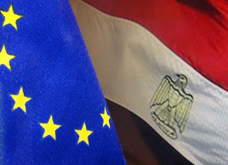The European Union’s 28 foreign ministers are to hold emergency talks Wednesday to review the bloc’s relations with Egypt, a European Commission spokesman said.
The European Union's 28 foreign ministers are to hold emergency talks Wednesday to review the bloc's relations with Egypt, a Europ ean Commission spokesman said.
ean Commission spokesman said.
A decision to convene the meeting at around noon in Brussels on Wednesday was agreed by senior diplomats from EU member states who gathered for a first round of emergency talks Monday on the spiraling bloodshed in Egypt.
Ambassadors on the bloc's Political and Security Committee were called away from their summer break to prepare a common stand after the death toll from five days of violence in Egypt climbed to almost 800.
The meetings come amid a mounting international outcry over the violence and warnings from Brussels that the bloc will "urgently review" ties with the Arab world's most populous country.
"Recent developments in Egypt, and more particularly the violence of the last days, are extremely worrying," the presidents of the European Council and European Commission, Herman Van Rompuy and Jose Manuel Barroso, said in a rare joint foreign policy statement.
"It is crucial that violence ends immediately," they said on the eve of Monday's meeting.
"The EU will urgently review in the coming days its relations with Egypt."
At stake is nearly five billion Euros ($6.7 billion) in loans and grants promised by the world's top aid donor to Egypt for 2012-2013. It includes one billion Euros from the EU with the rest from European banks the EIB and EBRD.
EU aid however has been made contingent on political and judicial progress so no new direct budget support has been approved for the Egyptian government since 2012 due to a lack of reform.
German Chancellor Angela Merkel on Sunday suggested a freeze on arms supplies and her Foreign Minister Guido Westerwelle expressed "shock" Monday over a "terror attack" in the Sinai border region near Israel in which 25 Egyptian police died.
With calls in some European capitals to suspend aid or slap sanctions on those responsible for the bloodshed, Monday's talks will prepare for concrete decisions to be made at the ministerial gathering 48 hours later.
EU foreign ministers have not met since July 22, when they urged Egypt's army to stand aside and allow a peaceful transition to civilian rule following the military overthrow of president Mohammad Mursi.
In their statement, Van Rompuy and Barroso urged an end to the violence, a resumption of political dialogue, and a return to democracy.
"While all should exert maximum restraint, we underline the particular responsibility of the interim authorities and of the army in bringing clashes to a halt," they said.
"The calls for democracy and fundamental freedoms from the Egyptian population cannot be disregarded, much less washed away in blood."
The EU special envoy for Egypt, Bernardino Leon, briefed the EU diplomats.
He told the Washington Post this weekend that the United States and its European and Gulf allies were close to a peace deal two weeks ago between supporters of Mursi and Egypt's military.
The deal called for supporters of the ousted Islamist president to abandon their street camps in exchange for a promise of non-violence from the authorities.
It was supposed to lead to talks between the army-installed interim government and Mursi's Muslim Brotherhood, but army chief General Abdel Fattah al-Sisi could not be convinced.
Leon, US Deputy Secretary of State William Burns, and the foreign ministers of Qatar and the United Arab Emirates spent weeks seeking a compromise in Egypt.
Last week's bloodbath has provided fresh momentum to such efforts. French President Francois Hollande and Merkel last week raised the specter of the EU rethinking its cooperation with Egyptian authorities.
But Withholding Aid Remains Sensitive.
As tourism revenue dries up and European firms close Egyptian plants due to the violence, Denmark last week announced it was suspending development projects taking place in direct collaboration with the government and with public institutions.
But Sweden's Foreign Minister Carl Bildt said on Twitter last week: "Our aid consists primarily of support to human rights and women's organizations. Not so wise to suspend that right now."